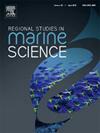Richness of the exploited species in the octopus fisheries of the Gulf of Mexico
IF 2.1
4区 环境科学与生态学
Q3 ECOLOGY
引用次数: 0
Abstract
A wide variety of octopus species are commercially harvested in artisanal fisheries, but official landing data are still limited. This study thoroughly examined landings from 10 ports across four sampling operations to evaluate the species richness of octopuses marketed in the southern Gulf of Mexico (GoM). We selected a total of 61 specimens for morphological and meristic analysis and conducted COI genetic identification on 11 specimens that exhibited ambiguous morphological traits. We identified two genera and seven octopus species by integrating morphometric and genetic methods. The Chao richness index suggests that at least nine species can be captured in southern GoM fisheries. Our combination of field identifications and literature reviews revealed four target species: Octopus maya, O. americanus, O. insularis, and Callistoctopus furvus. Additionally, we found two incidental species, Amphioctopus burryi and O. hummelincki, and three discarded species: O. briareus, Macrotritopus defilippi, and O. joubini. These findings highlight the multi-species composition of the octopus fishery in the region, revealing greater diversity than is currently recognised in management plans. The results underscore the need to revise management strategies to account for this biodiversity, thereby ensuring the sustainable exploitation of these valuable resources.
求助全文
约1分钟内获得全文
求助全文
来源期刊

Regional Studies in Marine Science
Agricultural and Biological Sciences-Ecology, Evolution, Behavior and Systematics
CiteScore
3.90
自引率
4.80%
发文量
336
审稿时长
69 days
期刊介绍:
REGIONAL STUDIES IN MARINE SCIENCE will publish scientifically sound papers on regional aspects of maritime and marine resources in estuaries, coastal zones, continental shelf, the seas and oceans.
 求助内容:
求助内容: 应助结果提醒方式:
应助结果提醒方式:


